The Basques are a Southwestern European ethnic group, characterised by the Basque language, a common culture and shared genetic ancestry to the ancient Vascones and Aquitanians. Basques are indigenous to, and primarily inhabit, an area traditionally known as the Basque Country —a region that is located around the western end of the Pyrenees on the coast of the Bay of Biscay and straddles parts of north-central Spain and south-western France.

Self-determination refers to a people's right to form its own political entity, and internal self-determination is the right to representative government with full suffrage.

In Spain, an autonomous community is the first sub-national level of political and administrative division, created in accordance with the Spanish Constitution of 1978, with the aim of guaranteeing limited autonomy of the nationalities and regions that make up Spain.
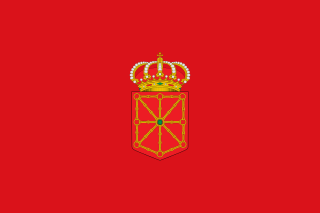
Navarre, officially the Chartered Community of Navarre, is a landlocked foral autonomous community and province in northern Spain, bordering the Basque Autonomous Community, La Rioja, and Aragon in Spain and Nouvelle-Aquitaine in France. The capital city is Pamplona. The present-day province makes up the majority of the territory of the medieval Kingdom of Navarre, a long-standing Pyrenean kingdom that occupied lands on both sides of the western Pyrenees, with its northernmost part, Lower Navarre, located in the southwest corner of France.

Pamplona, historically also known as Pampeluna in English, is the capital city of the Chartered Community of Navarre, in Spain.

The Basque Country is the name given to the home of the Basque people. The Basque Country is located in the western Pyrenees, straddling the border between France and Spain on the coast of the Bay of Biscay.

The Kingdom of Navarre, originally the Kingdom of Pamplona, was a Basque kingdom that occupied lands on both sides of the western Pyrenees, with its northernmost areas originally reaching the Atlantic Ocean, between present-day Spain and France.

Fuero, Fur, Foro or Foru is a Spanish legal term and concept. The word comes from Latin forum, an open space used as a market, tribunal and meeting place. The same Latin root is the origin of the French terms for and foire, and the Portuguese terms foro and foral; all of these words have related, but somewhat different meanings.
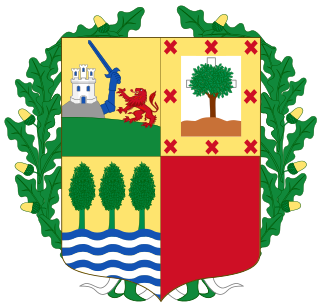
The Statute of Autonomy of the Basque Country of 1979, widely known as the Statute of Gernika, is the legal document organizing the political system of the Autonomous Community of the Basque Country' which includes the historical territories of Alava, Biscay and Gipuzkoa. It forms the region into one of the autonomous communities envisioned in the Spanish Constitution of 1978. The Statute was named "Statute of Gernika" after the city of Gernika, where its final form was approved on 29 December 1978. It was ratified by referendum on 25 October 1979, despite the abstention of more than 40% of the electorate. The statute was accepted by the lower house of the Spanish Parliament on November 29 and the Spanish Senate on December 12.

Spain is a diverse country integrated by contrasting entities with varying economic and social structures, languages, and historical, political and cultural traditions. The Spanish constitution responds ambiguously to the claims of historic nationalities while proclaiming a common and indivisible homeland of all Spaniards.

The Basques are an indigenous ethno-linguistic group mainly inhabiting the Basque Country. Their history is therefore interconnected with Spanish and French history and also with the history of many other past and present countries, particularly in Europe and the Americas, where a large number of their descendants keep attached to their roots, clustering around Basque clubs which are centers for Basque people.
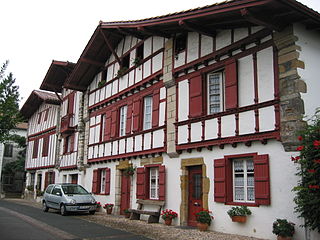
Basque surnames are surnames with Basque-language origins or a long, identifiable tradition in the Basque Country. They can be divided into two main types, patronymic and non-patronymic.

The Assemblea Nacional Catalana is an organization that seeks the political independence of Catalonia from Spain. It also promotes the independence of other Catalan-speaking regions, which are collectively known as the Catalan Countries.
EH Bildu, short for Euskal Herria Bildu, is a left-wing, Basque nationalist and pro-independence political party and a federation of political parties in Spain. It is the main political force of the abertzale left in Spain. EH Bildu is active in the Spanish Basque Country, that is, in the Basque Autonomous Community and Chartered Community of Navarre, as well as in the Treviño enclave of the Burgos Province. In the French Basque Country, it has an alliance with the party Euskal Herria Bai, with the goal of establishing a state for the Basque Country across the Spanish-French border.
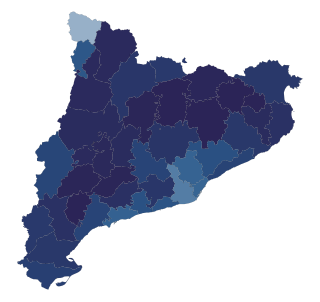
A non-binding Catalan self-determination referendum, also known as the Citizen Participation Process on the Political Future of Catalonia, was held on Sunday, 9 November 2014, to gauge support on the political future of Catalonia. While also referred to as "Catalan independence referendum", the vote was rebranded as a "participation process" by the Government of Catalonia, after a "non-referendum popular consultation" on the same topic and for the same date had been suspended by the Constitutional Court of Spain.

The Catalan Way, also known as the Catalan Way towards Independence, was a 400-kilometre (250 mi) human chain in support of Catalan independence from Spain. It was organized by the Assemblea Nacional Catalana (ANC) and supported by 14 nongovernmental groups. It took place in Catalonia on 11 September 2013, which is the National Day of Catalonia, known as Diada. Catalonia's Department of the Interior estimated the number of participants at about 1.6 million. The human chain followed the ancient Via Augusta, from Le Perthus up to Alcanar. According to Carme Forcadell, president of the ANC at that time, it was "a symbol of the unity of Catalan people to achieve national sovereignty".
The Estates of Navarre(French: États de Navarre, États généraux de Navarre, Cortes de Navarre) were created in 1317 under Philip II. The Estates of Lower Navarre(French: États de Basse-Navarre, Cortes de la Basse-Navarre) were first called into session on 28 August 1523 by Henry II after the definitive loss of Upper Navarre,
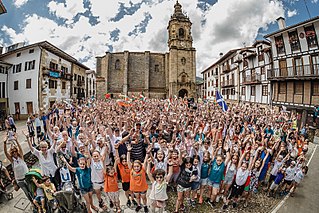
The Human Chain for Basque Self-determination, 2018 took place on 10 June in the Basque Autonomous Community of Spain organized by the movement Gure Esku Dago advocating for a self-determination vote with an independence option. It counted on the active support of the Basque National Party (PNV), EH Bildu, and Elkarrekin Podemos, the main forces of the autonomous region.

Maria Isabel Pozueta Fernández is a Basque sexologist, activist, politician and a member of the Congress of Deputies of Spain.

Basque independence is the principle and a movement for autonomy or self government for the Basque Country, independent of the Government of Spain and the Government of France.

























